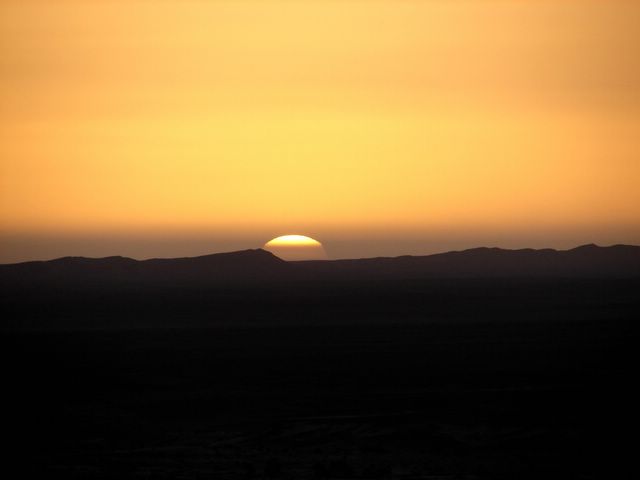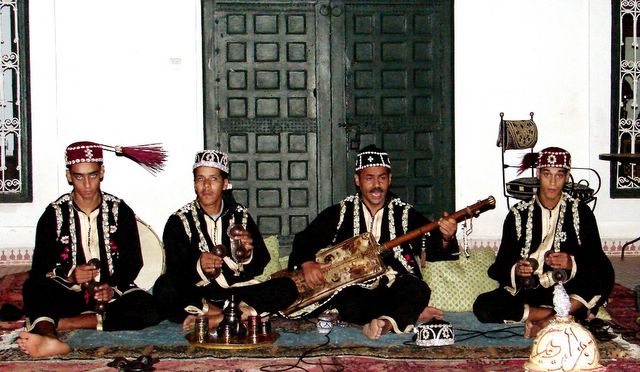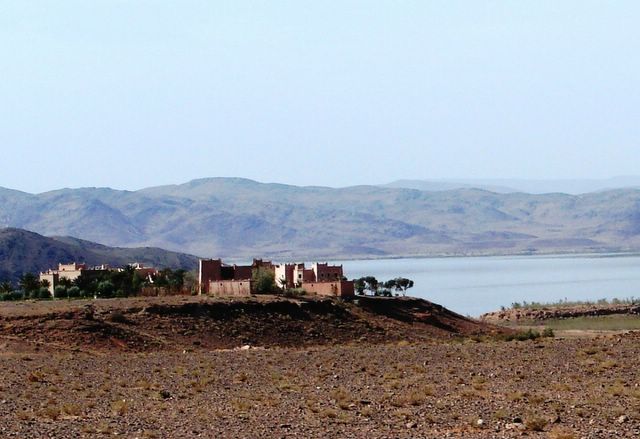The Amazigh: Returning from the Ashes of Neglect I
Part I - An American Introduction of a Native Civilization
.
 Although some know them as ‘Berbers’, the native people of North Africa would rather be called by the name once chosen by their ancestors, a name that has come to symbolize their spirit and define their struggle. Amazigh (sing.) or Imazighen (plur.) in the native language of North Africa means 'freemen' and it is in defense of their freedom that the Amazigh people have fought countless invasions and campaigns of repression by some of history’s most powerful armies (i.e., Roman, Byzantine, Arab, Turkish, European).
Although some know them as ‘Berbers’, the native people of North Africa would rather be called by the name once chosen by their ancestors, a name that has come to symbolize their spirit and define their struggle. Amazigh (sing.) or Imazighen (plur.) in the native language of North Africa means 'freemen' and it is in defense of their freedom that the Amazigh people have fought countless invasions and campaigns of repression by some of history’s most powerful armies (i.e., Roman, Byzantine, Arab, Turkish, European).Their cause and struggle continues to be ignored by many around the world. In fact many who are familiar with the word ‘Berber’ associate it with some kind of carpet when it refers to an entire civilization. So, let us cover some basics about who the Amazigh people are. They are people of no particular race who are considered to be the native people of North Africa. Their presence in that part of the world dates back to some 5,000 years B.C. Their biggest and strongest asset is their language and their common value system. Although they were largely forgotten by modern history, the Amazigh people are now awakening to the sounds of democracy and freedom in one of the most troubled regions of the world.
The task of introducing the Amazigh people to the world is not an easy one and would certainly require an exhaustive essay that covers a healthy dose of historical and cultural information. Nonetheless, although somewhat simplistic, my approach is to describe the Amazigh people within the societal context of the intended audience. Here I try to introduce the Amazigh people to the American reader. As such, I find it useful to engage in a what-if exercise that implants the Amazigh people in America and defines their likely political affiliation given their present values and practices. This is an easy way for American readers to relate to the information thus presented about a civilization that is foreign to them.
The Amazigh people would likely vote for the GOP if they were in America. They are largely pro-business and pro-free trade. Indeed, throughout their history, the Amazigh people have always been known for their entrepreneurial savvy and their penchant for commerce. In Morocco, they are often envied for their business sense and their successful know-how of wealth creation despite limited opportunities and discrimination. At the center of their value system are trust and honor. Trust is always on deposit and honor is an inviolable virtue. Any breach of trust can condemn a relationship to eternal oblivion and any breach of honor can give rise to fierce resistance.
In business, they are enterpreneurial in that they seek to mitigate risks all while increasing the likelihood of success, but they still rely on trust as a gold standard. It is not at all unusual for an Amazigh shopkeeper, for instance, to trust a fellow citizen with the differed payment of purchases without any binding legal instruments. Simply put, to the Imazighen, deferred payment is preferable to deferred business. However, far from being naïve, Amazigh entrepreneurs engage in such conduct only when they perceive a state of shared values and personal integrity. It is, hence, no surprise that they are more inclined, at least initially, to trust their brethren rather than outsiders.
The Amazigh people would likely vote for the GOP if they were in America. They are conservative in that they are people of deep faith and wield a strong code of ethics. The Amazigh people of Morocco are mainly followers of a mystical form of Islam. The shrines of their local saints are revered and frequently visited. They heed calls for moral revival with great enthusiasm. On God, Gays, and Family, the Amazigh people would give Karl Rove a standing ovation. They do not, however, wear their faith on their sleeves and do not proselytize. This is again due to their belief in personal responsibility. They largely believe religion to be a personal relationship between God and his creation. Once I asked a respected Amazigh religious leader what he thought about jihadists. In a direct reference to UBL, he calmly replied: “Since when has the length of one’s beard reflect the depth of one’s faith”.
The Amazigh people are by in large individualists but they are also extremely loyal to their community. This sounds in itself like a contradiction, but it is not. Their individualism stems mainly from their economic orientation and their belief in personal responsibility. However, they are staunchly attached to their homeland and can rapidly coalesce into a unified block if their heritage and survival as a community is threatened. In the remote villages of North Africa, Imazighen are, by virtue of their environment, more communitarian than their urban brethren. They celebrate and mourn as a community, but often pursue life as individuals.
The Amazigh people would likely vote for the GOP if they were in America. They would argue for smaller government, less taxes and free trade. What is fascinating about the Amazigh is that they developed an elaborate legal system that provided for strong protections of private property and human life, as well as equitable distribution of property following death or divorce, centuries before the West advocated and adopted such principles. They banned the death penalty and adopted an economic/financial approach to judicial punishment. This leads to believe that in contemporary international politics, they would likely advocate for economic sanctions in place of military conflict. This also signals that, if they were in America, the Amazigh would likely break with the GOP on unilateral and preemptive war. They would also break with many Republican politicians on the death penalty.
The Amazigh are extraordinarily hospitable People. They genuinely enjoy receiving visitors and see it as a moral responsibility to provide for them while under their care. Every outsider that came to visit the Amazigh homeland would unequivocally tell you that hospitality is a major currency for these people. In the past, it was a virtue that cost them their freedom when their foreign guests turned against them. But, still, they never gave up such a noble quality, because as an Amazigh once told me: "We surely would lose our way as a people if we were to let our most cherished values decay over time.” The Amazigh people are and will always be some of the most optimistic and humble people around. Even in some of the most impoverished and neglected areas of their historical homeland, they never fail to remind you that they are well and need nothing but God’s blessings. There surely is a lot of pride in that as well.


























6 Comments:
“Since when has the length of one’s beard reflect the depth of one’s faith”
Hah! I thought that was my dad's line. He used to say that too. (:
WTG Jawad! What a great article!
I still don't know for sure how Imazighen became "Berbers" . Was it really mussolini who came up with that nasty word? Any idea?
February 21, 2005
YIKES! How did my pic get up there?
February 21, 2005
Hi Myrtus. Thank you for your comment. Regarding your question on the origin of the word "Berber", let me say that it dates far back before Mussolini's time.
It is said that the name "Berber" originates with the Romans, who followed the Greek custom of designating speakers of unintelligible languages as "barbarians". So, you can understand why Imazighen view it as a derogatory name.
February 22, 2005
A very interesting analysis. I never knew any of that. Are the Imazighen the followers of Sufism or do you mean some other mystical branch? If so, which one? How did they end up following the mystical tradition?
February 24, 2005
I am half Amazigh (the mother the father is Arab) and amazigh in Algeria are not very spiritual. We are the most secular of all Algerians. Everyone knows this here. This why they always attack us (*the Islamic terrorist). All Amazigh are not like Moroccan Amazigh I hope you know this well. Moroccans are very religius as a whole I have never met a secular Moroccan Amazigh or Arab but I know tons of Amazigh secular people and athiest and pagan in DZ but usually they are not religious at all.
April 29, 2005
Idries: Welcome to my Blog. Thank you for your comment. Unfortunately, I do not know much about my Amazigh brothers and sisters in Algeria - so I limited my observations to the Amazigh of Morocco.
One thing to build on what you have said. The Moroccan Amazigh movement, calls for the separation of mosque and state. It is basically the only movement calling for that in Morocco. Even the secular Arab nationalists are not calling for that. I think there is a difference between being secular and being non-religious. What is fascinating about the Amazigh of Morocco is that they are religious all while being secular - that is religion plays an important role in their lives but they also want religion out of governance. As I said in the post, this is possibly because Imazighen see religion as an individual responsibility - Sufi influence I surmise. It may also be due to the fact that Imazighen succeeded in making their Muslim faith coexist with their own unique legal framework and governance structure for centuries.
April 30, 2005
Post a Comment
<< Home